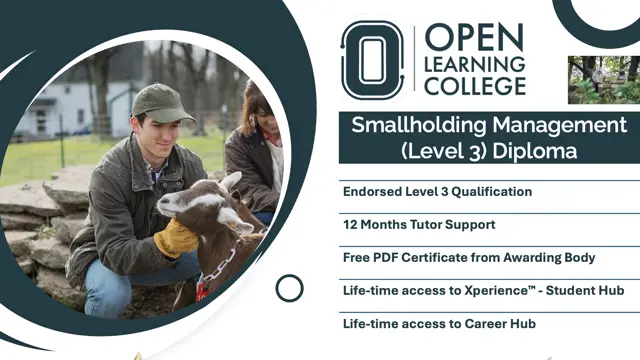Funding options available on our website
- QLS & OPA - Free
- Exam(s) / assessment(s) is included in price
- Tutor is available to students
- TOTUM card included in price What's this?

Funding options available on our website
Embark on a transformative learning journey with the UK’s most innovative home study provider, offering courses designed to unlock your true potential and facilitate the career change you desire. Access our distance learning courses directly from anywhere, anytime, and acquire industry-recognised Professional Qualifications essential for advancing in your career.
Specifically, explore the flexible and convenient Smallholding Management (Level 3) course, an ideal way to gain a diploma qualification. Whether you aim for further education, improved job prospects, or expanded knowledge, this comprehensive course allows you to prepare thoroughly for exams or careers through home study. Plus, it’s structured to be accessible and beneficial even if you have no prior knowledge in Smallholding Management.
This (Level 3) course is aimed at those with an interest in running a smallholding, either in an employment capacity, or simply for pleasure, or to live a self-sufficient lifestyle.
The course will provide students with a sound understanding of all aspects involved with managing your own small hold, ranging from designing the build right through to marketing your service.
Digital certificate - Included
Open Learning College have undergone external quality checks to ensure that the organisation and the courses’ it offers meet a high standard. Regular reviews of our courses are carried out as part of the endorsement process.
The course depth and study has been benchmarked at Level 3 against level descriptors published by Ofqual.
Visit www.qualitylicencescheme.co.uk for more information.
1. You will receive your accreditation directly from QLS, once you have successfully completed your course (certification fees are included in the course fee).
2. You will receive the Open Pathway Accreditation Diploma (OPA.dip) from Open Learning College.
the Smallholding Management (Level 3) course is divided into 10 modules.
Module 1: Introduction to Smallholding Management
This first unit of the Diploma in Smallholding Management course will introduce you to the concept of running a smallholding, or of achieving self-sufficiency. The unit will provide you with the foundation knowledge required for further studies related to running a smallholding, and will help you to clarify your aims. It covers the following:
Module 2: Building design
Unit 1 gives a general introduction to finding a suitable smallholding, and this unit continues on from there to work with plans for buildings on your smallholding. It looks at the following:
Module 3: Livestock selection and Management Part 1
There are many types of animal that could be kept on a smallholding, depending on land type, restrictions in place, size of area etc, as well as personal choice. This unit introduces the topic and covers:
Module 4: Livestock selection and Management Part 2
The subject of choosing suitable livestock and the keeping of animals is so large that it has been divided into two parts. This second part continues on from module 3, and covers the following:
Module 5: Grassland Management
The maintenance of land is extremely important, particularly if livestock are being kept in a relatively small area. This unit looks at the subject of grassland management, according to the types of species of animals being kept, The following topics are covered:
Module 6: Machinery and Equipment
Although small scale farming may not require as much in the way of equipment and machinery as a large scale farm, some machinery and equipment will be required in order to run the smallholding effectively, This unit covers the following:
Module 7: Growing Vegetables, Fruit and Flowers
This unit looks at the concept of a ‘market garden’ and introduces you to the growing of various plants on a smallholding. By the end of your study on this section you will have been introduced to the following topics:
Module 8: Financial Management
Even if your smallholding is not expected to make a profit, effective smallholding management requires sound financial management in order to be successful, The following topics are discussed in this unit:
Module 9: Marketing and General Management
Following on from the previous unit, this section looks at the importance of good management of a small business enterprise or successful self-sufficient unit, and also covers the important legal issues that need to be complied with. It covers the following:
Module 10: Ethical and Environmental Issues
This final unit of the course examines the various environmental impacts of farming on a small scale, and looks at the legislations affecting this type of activity. You will be introduced to the following topics.
Career development begins when you choose the firm or organisation where you’ll complete your APC. Once you’re committed to rural practice, your choice of career path is narrowed, but career development can be swift. Achieving chartered status increases opportunities for more responsibility and promotion.
Currently there are no reviews for this course. Be the first to leave a review.
This course is advertised on reed.co.uk by the Course Provider, whose terms and conditions apply. Purchases are made directly from the Course Provider, and as such, content and materials are supplied by the Course Provider directly. Reed is acting as agent and not reseller in relation to this course. Reed's only responsibility is to facilitate your payment for the course. It is your responsibility to review and agree to the Course Provider's terms and conditions and satisfy yourself as to the suitability of the course you intend to purchase. Reed will not have any responsibility for the content of the course and/or associated materials.